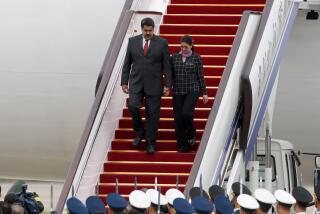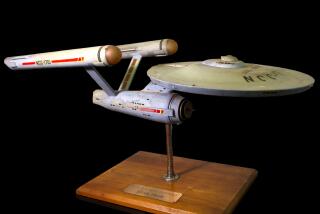Parts sale sparked seizure of F-14s
- Share via
A federal crackdown on the illegal sale of F-14 fighter jet parts to Iran led to the seizure of four privately owned military aircraft in San Bernardino County this week, after one jet owner surfaced in a sting operation to thwart the sale of an F-14 cockpit canopy, authorities said.
As military technicians dismantled the fighters Wednesday at airports in Chino and Victorville, federal officials said the investigation was continuing and no criminal charges had yet been filed.
The F-14 Tomcats, retired from military service, were supposed to have been scrapped in the late 1990s. Instead, a Navy official at the Naval Air Station at Point Mugu “improperly” approved the sale of three jet fighters in 1999 to an unauthorized Oxnard scrap company for $4,000 or less apiece, according to a federal affidavit. A fourth plane ended up in the hands of the producers of the TV drama “JAG,” who used it as a prop, according to federal court records.
“These planes were junk,” said Paul Rafferty, the attorney for Yanks Air Museum at Chino Airport, which bought three of the planes from a middleman for $50,000 in 1999 and still owns two of the aircraft.
The planes have been stripped of their engines, navigational equipment and virtually every other piece of hardware necessary to get the planes off the ground, he said.
Still, Rafferty said, federal agents told him the planes were being seized as “evidence” in a criminal investigation into the military’s original sale of the planes.
Rick Gwin, special agent in charge of the Western field office of the Defense Criminal Investigative Service, declined to comment on the investigation, saying only that the jets never should have been sold.
“These were warplanes in the hands of private individuals,” Gwin said. “We took them back because they were ... not acquired in the appropriate channels.”
The Pentagon, under pressure from Congress, in January suspended sales of thousands of spare parts from its recently retired F-14 fleet after criticism that the parts could be transferred to Iran.
Iran is the only country that still has an active F-14 program. It bought the jets from the U.S. in the 1970s when Iran was an ally.
The seizure of the F-14s comes when the Bush administration is grappling with Iran, which has rebuffed diplomatic efforts to suspend uranium enrichment for its nuclear program. President Bush has sent warships near the Persian Gulf country, and at the same time the United States has agreed to join high-level diplomatic talks with Iraq, Iran and Syria.
U.S. Sen. Ron Wyden (D-Oregon) has introduced a bill that would stop the Defense Department from selling surplus F-14 parts for good and would prohibit those who have already acquired such parts from exporting them.
“Every time the Pentagon says they’ve taken care of it and taken necessary precautions, people accidentally get their hands on parts,” said Wyden, a member of the Senate Intelligence Committee.
At Chino Airport, two of the jets are owned by Yanks and one by the Planes of Fame museum. The fourth, used on “JAG,” was sold to the company Aviation Warehouse, which supplies military props for TV shows and movies, and was being stored at the Southern California Logistics Airport in Victorville.
On Wednesday, federal officials said they discovered the improperly released F-14s during an investigation into illegal black-market arms sales between a Bakersfield company and Iranian officials, a case that first began in the late 1990s.
In 2001, the owner and two officers of Bakersfield-based Multicore Ltd. were convicted of violating the Arms Export Control Act in 2001 for acting as a front company for the Iranian government to acquire missiles and aircraft parts, according to court records.
British officials later arrested the top figures at the London-based affiliate of Multicore and invited U.S. officials to sort through warehouses full of seized weapons and purchase orders for parts from Iranian military officials.
U.S. agents also found paperwork documenting the sales between Multicore and U.S. parts dealers, including several transactions with Greg Forbes, a former parts dealer from Northern California who had sold at least one F-14 canopy and other parts to Multicore, said Clark Settles, a U.S. customs agent who handled the case.
The agents with the Defense Criminal Investigative Service later conducted a sting to snare Forbes, and that investigation led to the four F-14s in San Bernardino County, court records show.
Forbes agreed to acquire and sell an F-14 canopy to an agent posing as an Iranian businessman, according to federal officials and the affidavit filed in federal court this week.
Forbes then brokered a deal with a Yanks museum staffer, who agreed to trade an extra F-14 canopy owned by Yanks for an engine lifting device, museum officials said.
There was no evidence that the Yanks employee knew that the canopy, which the museum said it had obtained through a government surplus program, might end up in the hands of Iranian officials, Settles said.
“We had extra canopies, but we really needed one of these specialty lifts, so for us it was a great trade,” said Rafferty, the attorney for Yanks Air Museum. “We don’t know anything about what that guy was doing.”
Forbes’ deal with the undercover agent ultimately fell through after Forbes decided to contact the FBI and reported that he had been contacted by an Iranian official about F-14 parts, the affidavit stated.
When an undercover agent uttered the word “Iran,” Forbes figured something was up, he said Wednesday.
“I said, ‘You can’t sell it to Iran. You have to have an export license,’ ” Forbes said. “Then that’s when I called the FBI and DCIS. I called Customs, even.”
Forbes told FBI and defense intelligence officials that he had obtained the F-14 canopy from Yanks, which alerted the officials that the museum had excess F-14 parts.
In 2005, defense intelligence and Navy officials visited Yanks and other local museums to find out which museums had F-14s and ensure that they had been properly acquired, according to the affidavit. Officials discovered that four aircraft in Chino and Victorville had been improperly released by Navy officials and that there was no documentation showing they had been properly demilitarized.
The owner of Yanks, Charles Nichols, said the museum often had to scrounge far and wide for parts to rebuild the airplanes it acquired but added that it generally traded only within a close-knit network.
Nichols said his employees had been contacted only once by a person from another country who was seeking F-14 parts -- and that call was not returned.
sara.lin@latimes.com
*
Times staff writer Jonathan Abrams contributed to this report.
More to Read
Sign up for Essential California
The most important California stories and recommendations in your inbox every morning.
You may occasionally receive promotional content from the Los Angeles Times.














